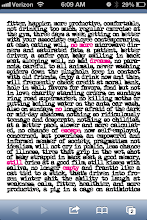I've been thinking about the section on novels that Jane Austen writes about on page 22. I started thinking about what she is saying here before we talked about it in class and it has been running through ever since. We mentioned that she is really advocating for the novel writer at this point, but we really didn't get into to what degree. One thing we did not get into was Austin's mention of the actual labor/production of novel writing. "There seems almost a general wish of decrying the capacity and undervaluing the labor of the novelist, and of slighting the performances which have only genius, wit, and taste to recommend them" (22). This continues on the next page with the public reception of the labor and content. Austin is pointing out the fact that many people looked past and/or didn't realize the deeper level of novels, or if they did, it was often a misinterpretation (much like Pamela or what Burney feared in Evelina), pointing out its flaw rather than seeing the social commentary or deep analysis of culture and people. Austin is very explicit here and compares novel reading to reading more acceptable texts like the Spectator. What makes Austin mad here is that people recognize the Spectator as a good text because of its analysis of culture and contributions to bettering it, but do not realize that novels functioned in the same way, taking a more creative approach than the essay form. There was a reluctance to let some novels transcend, and it seems like these novels were usually written by women. So this leads me to a few questions....
1) Is the value of the labor of the novel linked only to gender? (thus being undervalued and unrecognized)
2) Is the content of the novel undervalued because women don't have the capacity or formal educational background to write on worthy subjects? (I was actually reading about this in a book recently, but can't remember the title off the top of my head. Almost used it in one of my 5 theses I had...)
3) Why are novels and newspapers always misread, but usually not anything else?
It seems to me that one and two are almost inseparable...and thus lead to #3...and Austin anticipates this through her open comments to the reader that highlight her thought process and calculation behind the things she chooses in this book. She wants the reader to value her labor and recognize that everything is not just haphazardly thrown together, but that there is the same calculated analysis behind a novel as there is a Spectator essay. This is evident in all of the examples of Austin addressing the reader we talked about Thurs (168, 172-173...others I can't find right now...). SO this leads me back to my questions...Why should she have to do this? Why is the labor of novelists undervalued...?
Friday, April 24, 2009
Subscribe to:
Post Comments (Atom)




No comments:
Post a Comment